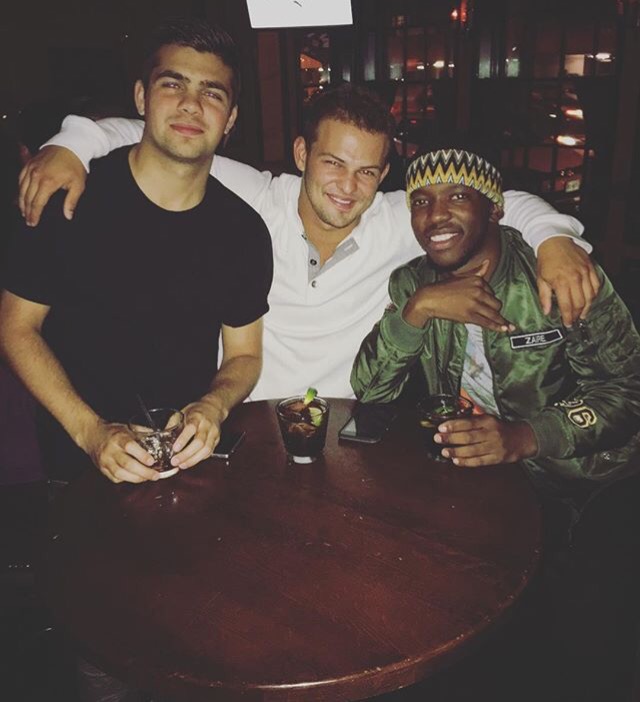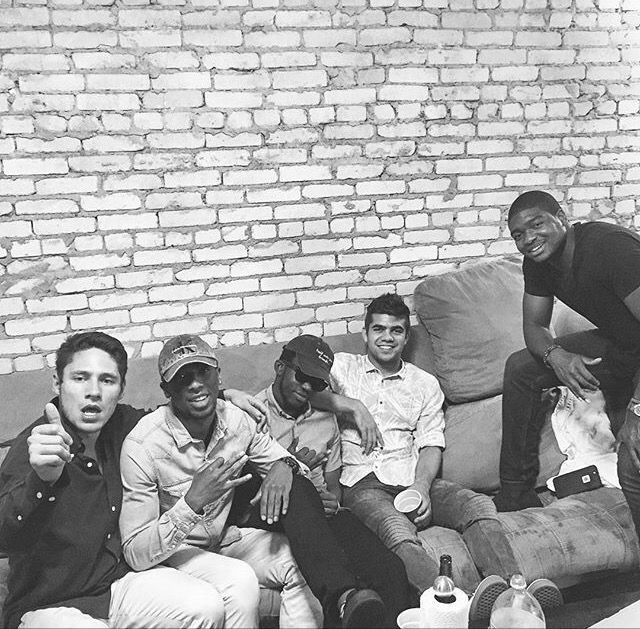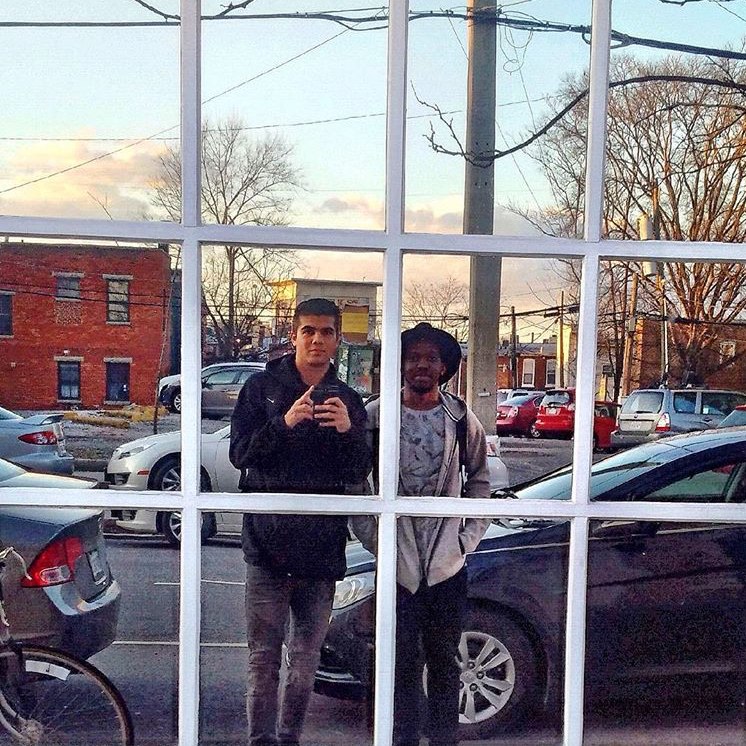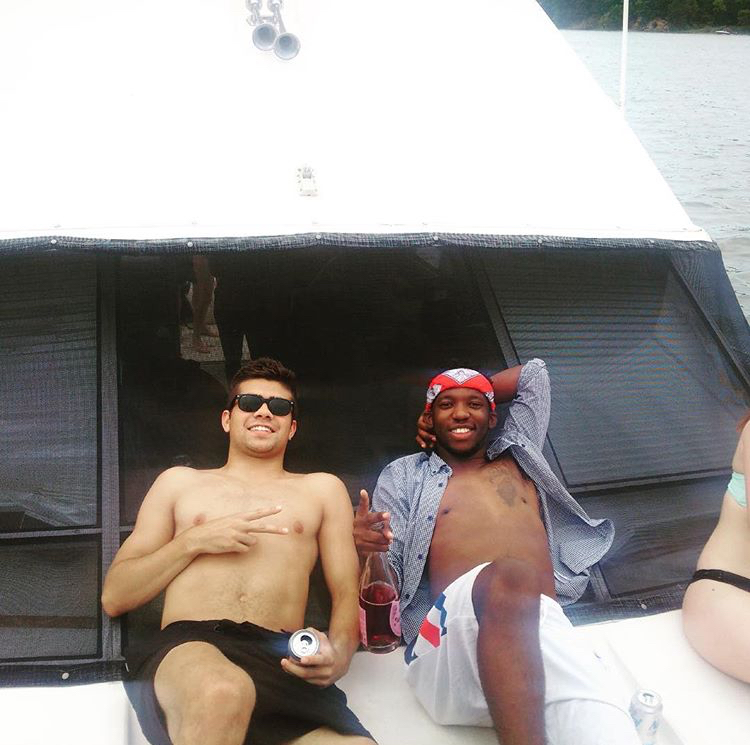



April 12th 2020.
Today marks the one year anniversary of 'Zaire's debut official release' The Lotus Moonstone E.P. To celebrate Lotus turning one we dug into the archives for an unreleased interview/review of the E.P. that was completed prior to the tapes release by Luc Fatton!
Happy Easter, Happy Lotus Day!
Enjoy.
Zaire, hailing from London and moving to the States in his early teenage years, has been developing his craft for years now. At age 22, all the time, work, experiences, and growth is coming to fruition in this debut E.P. The Lotus Moonstone, which he’ll be releasing later this month is an honest and introspective narrative.
Love and Soul are the two themes that blossom and radiate throughout this project. It’s one of those projects that makes you nod your head, but simultaneously really listen. It’s clear Zaire took a wholesome approach to creating this project, and carefully put together the pieces until it felt right. There’s an intangible element that exists throughout this project that I can only explain as authentic. Zaire also brings to light his perceptive lyricism and wordplay which takes multiple listens to really resonate fully.
For me, Voicemales is the standout track. As a close friend and fan, I had the luxury of listening to his earliest stuff- the Soundcloud drops, the unreleased tracks, as well as spontaneous freestyle sessions in the backrooms of college parties… In other words, I’ve been fortunate enough to witness the story unfold. At the University of Virginia (where we met freshmen year), there’s an annual event called Foxfield, which is essentially a weekend-long party centered around a horse race. (That’s how you know VA is in the south). We always make an effort to gather that weekend with our best friends. Back in 2016, after the horse race, we were on campus bouncing around apartment parties when all of a sudden we found ourselves amidst what we now classify as a “Groove Session.” A few friends were on strings and Chris (Zaire) was freestyling. People started just coming into the room and feeding off his energy. That was the first time I heard Chris sing. And I remember it catching me off guard. He was good. His voice was imperfect and raw, but he was going in. Towards the end, he had even created a hook that he would circle back to in-between verses. Again, this was all off the top. And I know he had been practicing and experimenting with his vocal skills behind the scenes. Now he’s killing full blown hooks on his songs. And the progression from 2016 to today is noteworthy and I think it’s important for the people who didn’t witness the evolution first hand, to know that it happened. That’s why, Voicemales, aside from being an incredible song in itself, is the standout track for me. The hooks and way the song is constructed is near perfection, and it captures the essence of his sound beautifully.
I got the chance to interview Zaire after sitting with his project for a few weeks. Here’s what he had to say:
Food For Thought W/ ZAIRE
Luc:
1. It seems that the earth and nature are a consistent theme throughout:
“If I’m the tree you’re the roots”
“We can cry through the sunshine, and still smile through the biggest storms”
(SWADHISHTHANA)
“You either drown or you float”
“Can’t have a mountain of lies and build trust on it”
“What’s a rose to a garden or a forest”
(SOUL SISTA pt. 1)
“Water seeds, just so the plants can grow”
(ROOM4U)
“Look what the sun did to the raisin...”
(RF’II pt 2)
“FUFU 4’D SOUL” (FUFU is a traditional African food made of crops like plantains and yams)
(FUFU 4’D SOUL)
Luc: Talk a little about that and why these natural elements play an important role to you and this project.
Zaire: Honestly, because I see Nature in everything. I see nature as the purest example of self. I see nature as the centre like if I ever go too far, or start to overindulge in anything like love & lust I feel like nature brings me back to one, or back to zero. This project is simply a reflection of navigating through that and using nature as a check and balance.
2. Luc: On T.L.M. you talk about duality. What does the line “When duality calls I hope polarity answers” mean?
Zaire: My thinking was when duality calls I hope polarity gives me the balance to understand the need for duality. Without context sometimes duality can be a crazy thing, so to me, the polarity is what provides the balance and even the understanding. I think it changes the way we look at things when you include polarity, we look at right and wrong, building and destroying as separate entities and mutually exclusive ideals, however, polarity connects them. They might be opposites but they work together in order to create an attraction or magnetic field that, ultimately need each other.
3. Luc: You talk about balance throughout this project, but particularly on T.L.M. and ROOM4U. You play with concepts of dark and light, evil and good, dirty and clean, depression and happiness… What is so important about the polarity of these concepts/emotions in everyday life?
Zaire: Ying and Yang. Also Just understanding that nothing is wasted, no time nor energy can truly be wasted in my eyes. Sometimes we tell ourselves that crying over something or being upset doesn’t help you in any way and I don’t agree. I believe every emotion and every feeling has its place. It’s like when 50 said: “sunny days wouldn’t be special…” you know, just the understanding that however polar these concepts/emotions might seem they’re both just as important as each other.
Sidebar: What’s cool about you pointing that out is the tracklist also reflects that; T.L.M is the first track and Room4U is the sixth before the bonus track so ultimately its the beginning and end of the project on opposite ends/extremes. I thought that was Kinda jiggy.
4. Luc: Pt. 1 Do you have a method that you use when you’re making a song? For example- hear the beat and then create from there or focus on the lyrics first then mold the beat to what you want. I guess, to put it simply, walk us through your creative process when making a song.
Zaire: The process for me is never the same, sometimes you hear the words before hearing the beat, vice versa. But for me, I think my process starts before the creation, before the writing and it starts with life. In order to create I need to live. I personally feel like this music and most of my art is a by-product of living. An ongoing conversation between me and the world. The best process is when I do something with the mandem and we’re having a good time something in my mind just clicks and takes notes. I usually wake up the next day and the song/idea feels like it was written in my sleep and it usually just writes itself. Some of my most personal & favourite pieces were written the morning after.
Luc: Pt.2 How do you know when a song is complete?
Zaire: I don’t think a song/art is ever complete, but I think the point where you’re done with it is when you believe in it enough to let it go out into the world and survive on its own. Like raising a child to an extent, how do you know your child is ready to leave home and face the world? You just pray you gave them enough tools. I think you have to leave enough space for the consumer too, the part of your song that is incomplete you leave to the consumer to fill in the rest and add their own life and experience into it. ONLY THEN I’d say it’s complete
5. Luc: What’s influenced your sound most? Any particular artists, albums, or genres that served as inspiration?
Zaire: Soul music, R&B, but mostly Neo-soul & Hip-Hop.I’m not a fan of genres/labels so the whole Soul-Hop thing started as a joke when we were first conceptualizing the project, but it seems to have stuck.
6. Luc: What were the biggest challenges in making the project?
Zaire: Rushing the process because I just wanted to release music was definitely a big challenge. Despite having little to no fanbase, Friends and the supporters I do have constantly asking “when are you dropping music?” “You’ve been quiet!” etc etc. Especially in the times we live in where music comes out so frequently and there's an abundance of content on the internet. I think the internet is oversaturated with content and in turn spoiled the consumer into having unrealistic expectations, in terms of how much music they’re entitled to or should expect. I think the artist is largely to blame for it too, so I think it's important to regulate that expectancy as an artist. Often times less is more. It allows people the chance to digest the art and really live with it, the way it was intended. So I had to constantly remind myself that life and the internet do not move at the same speed. Never to let anything or anyone rush your process and trust your gut instinct. This way when the art/music is ready to go, it can be appreciated and I can be proud of it without feeling like I could have done more.
I want to say vulnerability in every aspect was also a challenge. I know where I come from, I know what the music where I come from sounds like and what the subject matter consists of and how “tough” we “should” be. So being comfortable enough to even be this vulnerable was a challenge. The creative vulnerability I think was an even bigger challenge than the emotional vulnerability. Learning to get out of the way of the music and let it create itself. Creating the sound in your soul & heart versus the sound in your mind. Rappers have inflated ego’s because the focus is on them. In its purest element, MC’in was about the lyrics so it's easy to see yourself as the most important part of the composition, but becoming an artist and musician is often times about how every instrument works together and giving a piece what it needs vs what you want to do with it. Listening to the music and sometimes playing the background. I think that's the difference between those who can just “spit” MC’s and rappers who can make good music, getting rid of ego and not always being the most important part.
7. Luc: I know you read quite a bit. Were there any books in particular that influenced you when making this project?
Zaire: It would be tough to say one in particular, I think every book I read influences my music and my writing somehow. However, just for kicks, I was reading; The Celestine prophecy, Charles Bukowski and Assata Shakur’s autobiography during a lot of the recording process for this project.
8. Luc: Lastly, I’d be remiss not to ask about the title of the Project. For those who aren’t familiar, what is “The Lotus Moonstone,” and what personal significance does it have for you?
Zaire: The title of the project is very personal and has incredible significance to me, and I would love to break down the entire meaning however I do think some things should be left to the imagination. But what I will say is that it has a lot to do with healing.
Footage from one of the many infamous groove sessions
